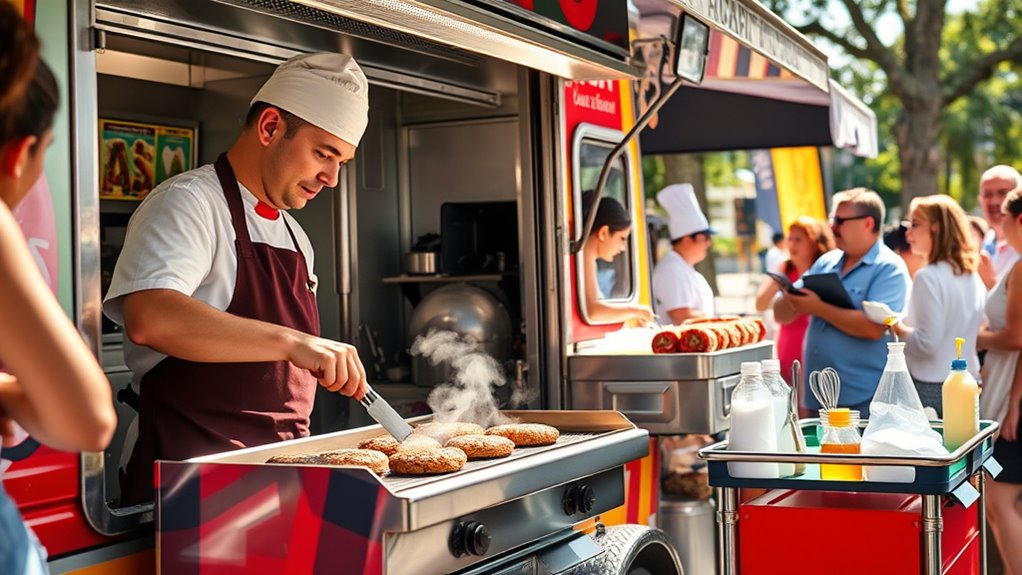To manage your food truck operations day-to-day, focus on planning menus and schedules in advance, keeping a close eye on inventory and equipment maintenance. Coordinate your staff effectively, ensuring everyone knows their duties, and stay engaged with customers through social media. Regularly monitor compliance, track customer feedback, and adapt your offerings accordingly. Staying organized and proactive will help your business run smoothly—keep exploring, and you’ll discover even more ways to optimize your operations.
Key Takeaways
- Plan menus, schedules, and promotions in advance to ensure efficient daily operations and attract customers.
- Monitor inventory levels and perform regular equipment maintenance to prevent downtime and reduce waste.
- Coordinate ingredient prep, storage, and staff responsibilities for smooth service during busy periods.
- Stay compliant with regulations, track market trends, and engage customers through social media for continuous improvement.
- Maintain a flexible, attractive food truck and incorporate feedback to adapt to changing market demands.
Planning and Scheduling Daily Tasks
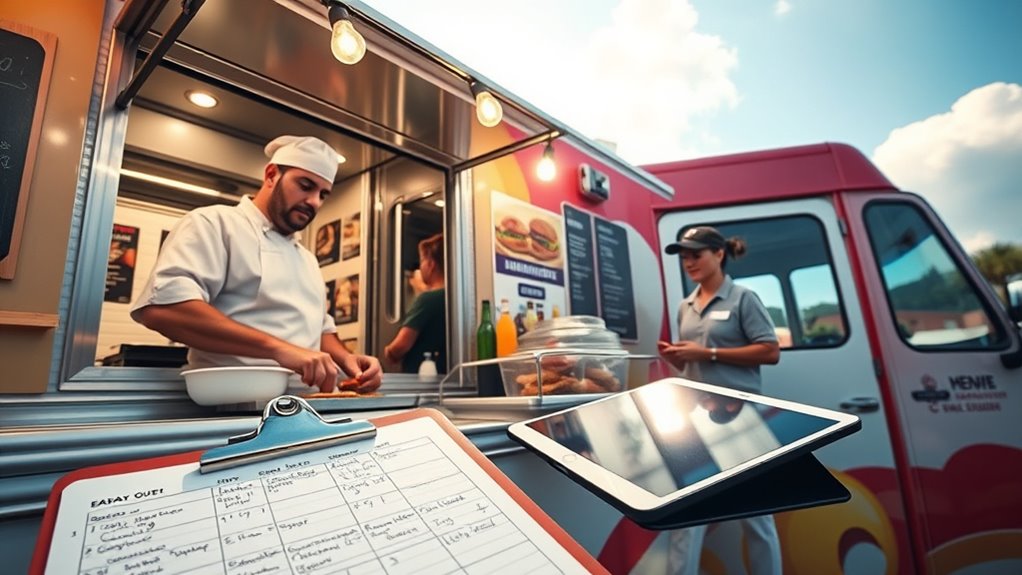
How can you guarantee your food truck runs smoothly each day? The key is effective planning and scheduling. Start with menu planning—know what dishes you’ll serve and prepare ingredients in advance to streamline service. Next, create a daily schedule that includes prep times, staffing shifts, and delivery windows. Incorporate social media promotion into your routine; post daily updates to attract customers and build excitement. Use calendars or planning apps to stay organized, ensuring everyone knows their responsibilities. Consistent planning prevents last-minute surprises and keeps operations efficient. Additionally, understanding cookie management can help you optimize online marketing efforts and improve customer engagement. By aligning your menu, promotions, and daily tasks, you set a solid foundation for a successful day. Clear schedules and proactive marketing make it easier to deliver quality food and excellent customer service.
Inventory Management and Stock Control

Effective inventory management begins with tracking your stock levels carefully and understanding your usage patterns. By doing so, you can prevent over-ordering and reduce food waste, which saves money and minimizes waste. Regularly check your inventory to identify what’s running low and what’s sitting unused. Building good relationships with your suppliers allows for better negotiations, helping you get the best prices and flexible order quantities. Keep a detailed record of your stock to spot trends and adjust orders accordingly. This proactive approach ensures you always have what’s needed without excess that could spoil. Additionally, staying informed about best anime movies can provide entertainment options during downtime, making your workday more enjoyable. Efficient stock control not only minimizes waste but also streamlines daily operations, ensuring your food truck runs smoothly and profitably. Proper inventory management is essential for sustainable success.
Preparing and Prepping Ingredients Efficiently

Preparing and prepping ingredients efficiently is essential for maintaining a smooth workflow and minimizing service delays. Start with effective ingredient sourcing by establishing reliable suppliers and organizing deliveries to ensure freshness and availability. When setting up your prep station, keep everything within easy reach—sharp knives, cutting boards, and containers—so you can work swiftly. Batch prep ingredients when possible; chopping vegetables or portioning meats ahead of time saves valuable minutes during busy service hours. Label and store prepped items properly to avoid confusion and waste. Clean as you go to maintain a safe, organized workspace. By streamlining your ingredient sourcing and setting up a dedicated prep station, you reduce clutter and increase efficiency, helping your food truck operate smoothly from start to finish. Incorporate proper organization techniques to further optimize your prep area and workflow.
Maintaining Equipment and Vehicle Upkeep
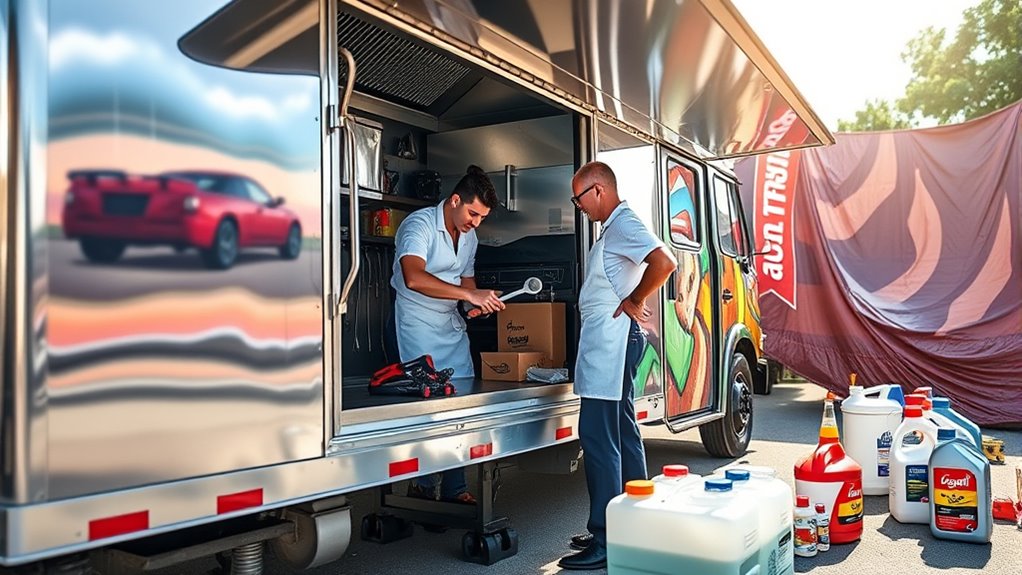
Regular maintenance of your equipment and vehicle is crucial for preventing breakdowns and ensuring consistent service. Conduct regular equipment inspections to catch issues early, such as worn-out parts or malfunctioning appliances, before they disrupt your operations. Keep a maintenance schedule for your vehicle, including oil changes, tire checks, and brake inspections, to extend its lifespan and improve safety. Proper vehicle maintenance also helps you avoid costly repairs and downtime. Make sure all equipment is thoroughly cleaned and tested daily, especially before service starts. Staying proactive with maintenance not only keeps your food truck running smoothly but also maintains food safety standards. Incorporating sound vibrations into your routine can enhance cellular regeneration and overall health. Consistent upkeep builds reliability, so you can focus on serving customers without unexpected interruptions.
Staffing and Workforce Coordination
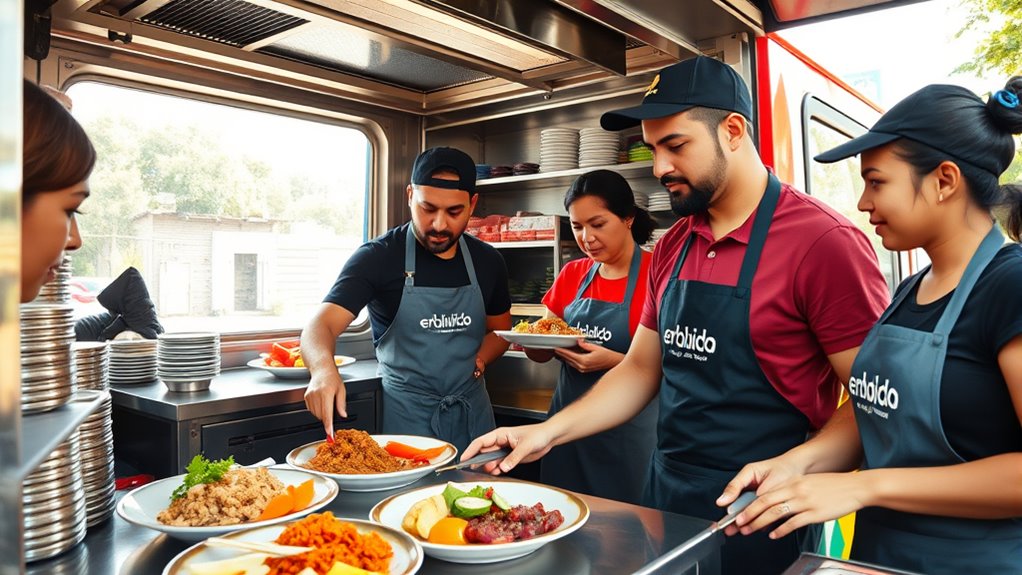
Managing staffing and workforce coordination is essential for keeping your food truck operations running smoothly. You need motivated staff who are well-trained to handle busy hours and unexpected challenges. A motivated team boosts efficiency and morale, directly impacting customer satisfaction. Regular staff training ensures everyone knows safety standards and menu updates, preventing mistakes. To foster team motivation, consider recognizing achievements and encouraging open communication. Use this table to visualize staff roles and responsibilities:
| Role | Responsibilities | Skills Needed |
|---|---|---|
| Cook | Prepare food | Fast-paced cooking, hygiene |
| Server | Customer orders | Communication, efficiency |
| Manager | Supervise staff | Leadership, problem-solving |
| Cleaner | Maintain cleanliness | Attention to detail |
| Delivery Driver | Transport food to events | Driving, time management |
Additionally, incorporating training programs can help improve overall team performance and adaptability in your daily operations.
Customer Service and Engagement Strategies

To stand out in a competitive food truck scene, delivering exceptional customer service and engaging with your patrons is essential. You should actively listen to customer feedback, using it to improve your offerings and service quality. Encourage patrons to share their experiences, whether through direct conversations or social media platforms. Respond promptly to reviews and comments, showing you value their input and care about their satisfaction. Use social media to create a community around your food truck, posting engaging content, updates, and special promos. Personal interactions and genuine engagement build loyalty and foster positive word-of-mouth. Remember, happy customers not only return but also become ambassadors, helping your food truck thrive in a busy marketplace. Consistent engagement is key to long-term success. Incorporating expert voice actors into your promotional videos can also elevate your brand credibility and make your messaging more compelling.
Handling Financial Transactions and Record-Keeping

Handling financial transactions efficiently is essential for keeping your food truck profitable and organized. Use a reliable cash register to quickly process sales and minimize errors. Always give customers purchase receipts for transparency and record-keeping. Keep detailed logs of daily sales, including cash and card transactions. Regularly reconcile your cash register with recorded sales to catch discrepancies early. Incorporating data privacy considerations ensures that sensitive customer information remains protected during record-keeping.
Navigating Permits, Licenses, and Compliance

Managing permits, licenses, and compliance is crucial for legal and smooth food truck operations. You need to understand local regulations to avoid fines and shutdowns. This includes securing the necessary food safety regulations certifications and health department approvals. Additionally, marketing compliance ensures your advertising and branding meet legal standards. Incorporating AI in Business can help streamline compliance monitoring and ensure adherence to evolving regulations.
Adapting to Market Trends and Feedback
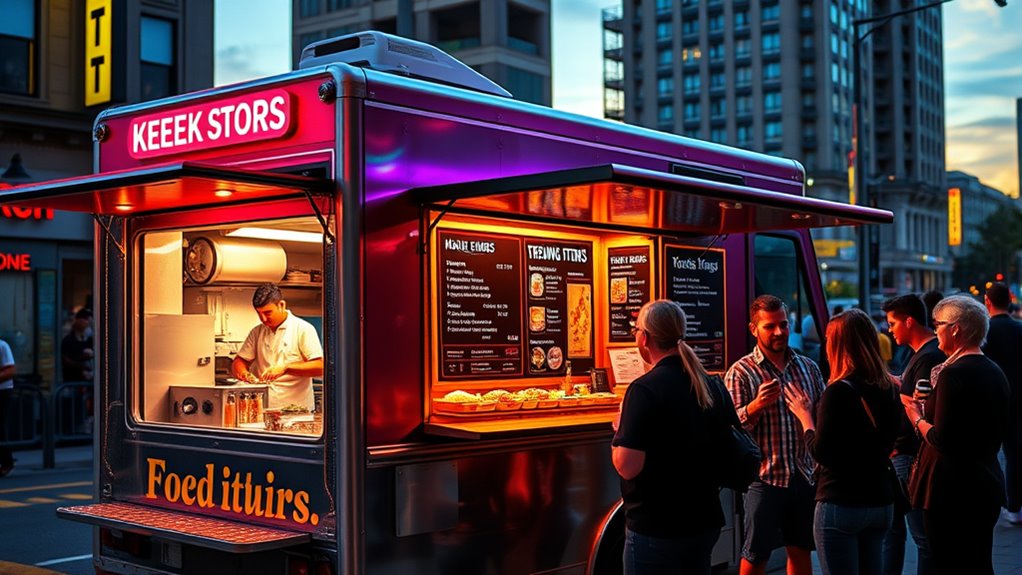
Staying attuned to market trends and customer feedback is essential for keeping your food truck competitive and relevant. By regularly monitoring what customers enjoy and respond to, you can implement menu innovation that appeals to current tastes. Pay attention to social media marketing insights—comments, shares, and reviews—to identify popular dishes and areas for improvement. Adjust your menu accordingly, introducing new items or refining existing ones based on feedback. Engaging with your audience online helps build loyalty and keeps your offerings fresh. Adaptability is key in a dynamic market; staying flexible allows you to respond quickly to emerging trends. Understanding the importance of customer preferences can help you tailor your offerings more effectively. This proactive approach ensures your food truck remains attractive, relevant, and competitive in a constantly evolving food scene.
Frequently Asked Questions
How Do I Handle Unexpected Vehicle Breakdowns During Busy Hours?
When faced with unexpected vehicle breakdowns during busy hours, you should stay calm and quickly assess the situation. Rely on your emergency preparedness plan, which includes having contact information for roadside assistance and spare parts on hand. Regular vehicle maintenance reduces breakdown risks, so stay proactive. Communicate with your team and customers clearly, and prioritize safety. Handling breakdowns efficiently guarantees minimal disruption and keeps your food truck running smoothly.
What Are Effective Ways to Motivate and Retain Food Truck Staff?
They say, “A team that feels valued works better.” To motivate and retain your staff, focus on team incentives and regular staff recognition. Offer bonuses, flexible schedules, or opportunities for growth. Celebrate milestones and show appreciation publicly. When your team feels appreciated and rewarded, they’re more likely to stay committed and energized. Remember, a motivated crew drives success and keeps your food truck thriving in the long run.
How Can I Minimize Waste While Maintaining Ingredient Freshness?
To minimize waste and keep ingredients fresh, focus on strong inventory management. Regularly track what’s in stock and rotate items to guarantee older ingredients get used first, improving ingredient preservation. Use proper storage techniques to extend freshness, like airtight containers and correct temperatures. Adjust your orders based on sales patterns to prevent overstocking. This approach reduces waste, cuts costs, and keeps your food quality high for customers.
What Are Best Practices for Managing Cash Flow Fluctuations?
Think of managing cash flow like steering a boat through changing tides. You’ll want to regularly update your cash flow forecasting to anticipate highs and lows, just like adjusting your sails. Practice expense management by cutting unnecessary costs during slow periods and saving for busy days. Staying proactive helps you navigate fluctuations smoothly, ensuring your food truck stays afloat no matter what the financial waters bring.
How Do I Build Strong Relationships With Local Vendors and Partners?
To build strong relationships with local vendors and partners, focus on community engagement and participating in collaborative events. Regularly communicate and show genuine interest in their needs, creating a sense of trust. Attend local gatherings, support shared goals, and promote their businesses alongside yours. By fostering open dialogue and working together, you establish mutually beneficial relationships that strengthen your network and boost your food truck’s visibility in the community.
Conclusion
Keeping your food truck running smoothly requires attention to detail and adaptability. Did you know that 70% of successful food trucks regularly update their menus based on customer feedback? By staying organized, maintaining your equipment, and engaging with your customers, you can boost your chances of success. Remember, continuous improvement and flexibility are key—so keep learning, stay motivated, and enjoy the ride of managing your food truck business daily.
